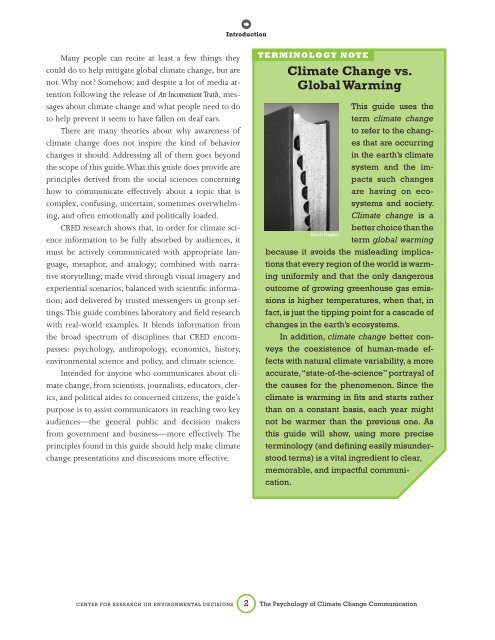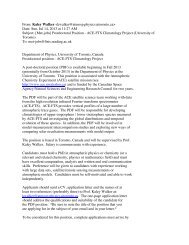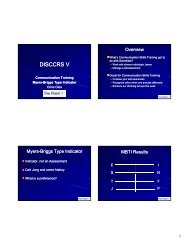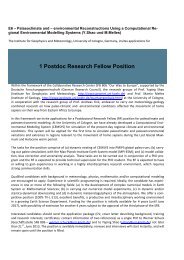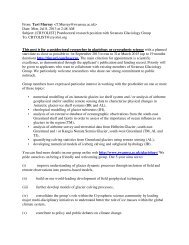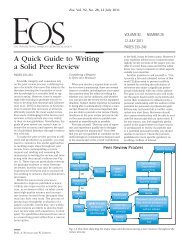CRED Guide PDF - The Psychology of Climate Change ...
CRED Guide PDF - The Psychology of Climate Change ...
CRED Guide PDF - The Psychology of Climate Change ...
Create successful ePaper yourself
Turn your PDF publications into a flip-book with our unique Google optimized e-Paper software.
Introduction<br />
Many people can recite at least a few things they<br />
could do to help mitigate global climate change, but are<br />
not. Why not Somehow, and despite a lot <strong>of</strong> media attention<br />
following the release <strong>of</strong> An Inconvenient Truth, messages<br />
about climate change and what people need to do<br />
to help prevent it seem to have fallen on deaf ears.<br />
<strong>The</strong>re are many theories about why awareness <strong>of</strong><br />
climate change does not inspire the kind <strong>of</strong> behavior<br />
changes it should. Addressing all <strong>of</strong> them goes beyond<br />
the scope <strong>of</strong> this guide. What this guide does provide are<br />
principles derived from the social sciences concerning<br />
how to communicate effectively about a topic that is<br />
complex, confusing, uncertain, sometimes overwhelming,<br />
and <strong>of</strong>ten emotionally and politically loaded.<br />
<strong>CRED</strong> research shows that, in order for climate science<br />
information to be fully absorbed by audiences, it<br />
must be actively communicated with appropriate language,<br />
metaphor, and analogy; combined with narrative<br />
storytelling; made vivid through visual imagery and<br />
experiential scenarios; balanced with scientific information;<br />
and delivered by trusted messengers in group settings.<br />
This guide combines laboratory and field research<br />
with real-world examples. It blends information from<br />
the broad spectrum <strong>of</strong> disciplines that <strong>CRED</strong> encompasses:<br />
psychology, anthropology, economics, history,<br />
environmental science and policy, and climate science.<br />
Intended for anyone who communicates about climate<br />
change, from scientists, journalists, educators, clerics,<br />
and political aides to concerned citizens, the guide’s<br />
purpose is to assist communicators in reaching two key<br />
audiences—the general public and decision makers<br />
from government and business—more effectively. <strong>The</strong><br />
principles found in this guide should help make climate<br />
change presentations and discussions more effective.<br />
Terminology Note<br />
<strong>Climate</strong> <strong>Change</strong> vs.<br />
Global Warming<br />
This guide uses the<br />
term climate change<br />
to refer to the changes<br />
that are occurring<br />
in the earth’s climate<br />
system and the impacts<br />
such changes<br />
are having on ecosystems<br />
and society.<br />
<strong>Climate</strong> change is a<br />
better choice than the<br />
Erich Nagler<br />
term global warming<br />
because it avoids the misleading implications<br />
that every region <strong>of</strong> the world is warming<br />
uniformly and that the only dangerous<br />
outcome <strong>of</strong> growing greenhouse gas emissions<br />
is higher temperatures, when that, in<br />
fact, is just the tipping point for a cascade <strong>of</strong><br />
changes in the earth’s ecosystems.<br />
In addition, climate change better conveys<br />
the coexistence <strong>of</strong> human-made effects<br />
with natural climate variability, a more<br />
accurate, “state-<strong>of</strong>-the-science” portrayal <strong>of</strong><br />
the causes for the phenomenon. Since the<br />
climate is warming in fits and starts rather<br />
than on a constant basis, each year might<br />
not be warmer than the previous one. As<br />
this guide will show, using more precise<br />
terminology (and defining easily misunderstood<br />
terms) is a vital ingredient to clear,<br />
memorable, and impactful communication.<br />
Center for Research on Environmental Decisions <strong>The</strong> <strong>Psychology</strong> <strong>of</strong> <strong>Climate</strong> <strong>Change</strong> Communication


